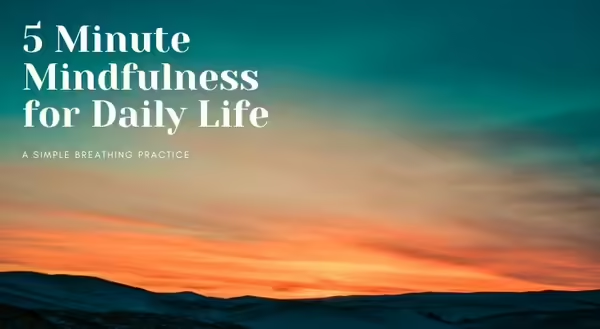
It goes without saying that life as we know it has changed. The demands from working remotely, pressures from homeschooling, worries about finances, family, health, jobs, and security have caused us to experience an incredibly stressful period of time. Seemingly endless demands and concerns can put additional stress on our time and resources.
On “good” days, I have found I am able to focus on the blessings I am experiencing during this time. More time with family. More home cooked meals. The ability to get long over-due projects completed. Even just the joy of a warm, sunny day. On “not-so-good” days, it’s a struggle to maintain focus on gratitude and positivity when I am consumed with thoughts about the future. When I think about it, the good days are days where I live in the moment, choosing not to focus on the stress of the situation or the endless to-do tasks - an intentional choice to pay attention to the moments of laughter and connection.
In an effort to slow down and fully experience my everyday life, I have resolved to be more mindful during this difficult time. To linger in the moment longer. To be present while engaging in conversation. To be aware of each moment. To put the stress of the current situation aside to truly enjoy the gifts each day brings. To be more mindful.
Simply put, mindfulness is paying purposeful attention to the present moment. The practice of mindfulness has been around for decades and has many benefits including providing more appreciation for life, improvement in focus and attention, and reduction of stress levels. As mindfulness is the act of focusing on and experiencing the present, it can be applied to just about anything we do in life – including the simple moments in everyday life. Also, if the additional pressures of current world events induce stress, practicing mindfulness is an excellent way to focus and relieve stress.
Mindfulness can be practiced anytime, anywhere. The simple act of paying attention to and appreciating the sights, sounds, and smells of your everyday experience is the act of being mindful. Eat mindfully at mealtimes by slowing down and savoring each bite of your meal. Notice how it looks, how it smells, and anticipate how it will taste. Mindfulness practices can even be applied to your daily chores or home improvement projects by slowing down, noticing what is around you, and paying attention to your breathing and pace. Taking note of the blueness of the sky, the sweet smell of spring air, or the feeling of the warm sun on your skin all bring you to notice and appreciate the present moment – the essence of being mindful.
If stress interferes with your ability to live in the moment, consider adopting a daily practice of mindful breathing. As little as five minutes of mindful breathing each day can help clear your mind of stress and improve your ability to focus on the present. Mindful breathing can help you concentrate by reducing your mind’s distracting thoughts. Tension can be released from the body and anxiety can be reduced.
To practice mindful breathing, follow these steps:
- Sit comfortably on the floor or in a chair, making sure to keep your back straight.
- Take a deep breath and close your eyes.
- Breathe normally, focusing your attention on your breathing. Feel the air moving in and out of your lungs.
- As you are focusing on your breathing, you will likely experience thoughts or distractions. As you experience these distractions, do not give them too much attention. Acknowledge that your mind has wandered and return your focus back to your breathing.
- Start by doing this practice a few minutes each day and then gradually increase your time.
It’s very easy to get lost in the stress and demands of this difficult season. If you feel like your daily life is a blur or activity and stress, it doesn’t have to be that way! By practicing mindfulness, you can slow time down, reduce stress, and thoroughly enjoy your everyday experience.
As we focus on mindfulness during Mindful May, it is my sincere hope that you create time and space to explore mindfulness practices, to experience the benefits that mindfulness can provide, and to engage in this important aspect of self-care.
Take care and be mindful!